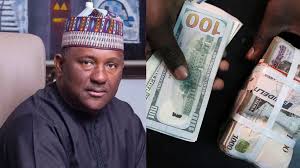The Chairman of BUA Group, Abdul Samad Rabiu, has expressed optimism that the naira will appreciate further in the coming months, predicting that the exchange rate could strengthen to between ₦1,300 and ₦1,400 to the dollar before the end of 2025.
Rabiu gave the projection while speaking with journalists after a meeting with President Bola Tinubu at the Presidential Villa in Abuja on Wednesday. He commended the government’s economic reforms, describing them as bold and decisive steps that are beginning to yield results.
“I expect that the exchange rate is going to strengthen even further. I expect that the rate should come down to maybe ₦1,300, ₦1,400 before the end of the year. And this is something that we should all celebrate,” he stated.
The industrialist noted that reforms introduced since 2023 have eased pressure on businesses by making it possible for them to independently source foreign exchange. According to him, the reliance on the Central Bank of Nigeria (CBN) for dollar supply has reduced, as companies are now able to access FX through international banking systems and credit card platforms.
“For all of these, we must give full credit to His Excellency and the government. Their bold reforms and decisive policies are creating the foundation for a stronger economy, a more stable currency, and a better future for businesses and Nigerians alike,” he added.
On inflation and food prices, Rabiu argued that commodity costs have fallen compared to last year, stressing that Nigerians need to be patient as the policies take root. “If you look at the prices of food items last year and what we have today, you’ll see that there is a significant reduction in all the commodities. So, I think we just need to be a bit more patient. Clearly, things are getting better, and we must continue to support the government,” he said.
President Tinubu’s administration, shortly after assuming office in May 2023, unified Nigeria’s multiple exchange rate windows and introduced a liberalised FX regime that allows the naira to float more freely. The move collapsed several official rates into a single benchmark, aligning the official and parallel markets more closely.
While the policy triggered sharp depreciation of the naira in its early months, government officials and some business leaders argue that it has removed distortions and artificial scarcity that previously undermined economic growth.
In July 2025, Rabiu had openly backed the reforms, pointing out that the liberalised FX regime had eliminated the need for businesses to “lobby” for dollars. He said under the old system, the official rate was far below the parallel market rate, forcing companies to depend on discretionary CBN allocations.
“I was making a joke a few weeks ago that I’ve only seen the current CBN Governor maybe twice since his appointment. That’s because I don’t need him. Before now, I used to visit the CBN every two weeks to lobby for FX. That was the only way to survive,” Rabiu remarked.
He emphasised that the new FX framework is more transparent and sustainable for private sector operators, contrasting it with past practices that he said constrained access to foreign exchange and encouraged inefficiencies.
Despite persistent inflationary pressures and concerns over high interest rates, the BUA chairman maintained that reforms are laying the groundwork for long-term stability. He urged Nigerians to remain patient and supportive of the government’s agenda.
The business leader’s forecast comes amid cautious optimism among policymakers and investors. While the naira has shown relative stability in recent weeks, analysts believe achieving sustained appreciation will depend on higher foreign exchange inflows, disciplined fiscal management, and structural reforms to boost productivity.
Rabiu’s remarks add to ongoing debates about the impact of Tinubu’s reforms, with many in the private sector acknowledging short-term pains but expressing confidence in longer-term gains.
